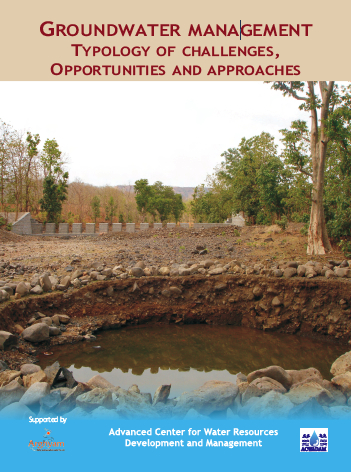Harshavardhan Dhawan
From policy to practice: Can National Water Policy 2020 bridge the gap?
Posted on 11 Apr, 2020 07:46 PMThe way water as a resource has been viewed in the policies of India has evolved significantly over the years. Reduction in per capita availability over the years (5177 to 1463 cubic metres between 1950-2015) has forced every new policy to change the way it has approached its management. It was considered an economic commodity in the second National Water Policy (NWP) drafted in 2002.

Decentralised groundwater governance to deal with the groundwater crisis
Posted on 17 Feb, 2020 05:43 PMThe challenges to sustain groundwater dependency in India are many where groundwater over extraction is not only leading to rapid depletion of the resource, but also giving rise to water quality issues in a situation where the response at the level of policy continues to be lukewarm.

Can recurring droughts in Maharashtra be offset by participatory groundwater management (PGWM)?
Posted on 20 Jan, 2016 09:02 AMMaharashtra is the fourth state following Karnataka, Chattisgarh, and Madhya Pradesh to seek out relief from the Union government thanks to more than 15,000 of its villages across Marathwada and parts of Western Maharashtra reeling under drought in 2015 [1].

Pooling borewells and opportunities
Posted on 03 Feb, 2014 12:48 PMGamalibai is a farmer in Malkaipeta Thanda, a small tribal hamlet of the Lambadi community in Ibrahimpur village, Ranga Reddy district in Andhra Pradesh. She does not have much in common with the image of the hearty, prosperous farmer that beams at us from posters selling agricultural machinery.

Angioplasty for groundwater or a heart attack waiting to happen?
Posted on 16 Aug, 2013 10:38 AM“What is in a name? That which we call a rose, would smell as sweet by any other”, goes the line from Shakespeare's Romeo and Juliet. There is quite a lot in a name, Juliet, especially if attaching the wrong terminology to a process is used to appropriate public funds - Rs. 800 crores, in fact.

Why participatory groundwater management is no longer an oxymoron: The story of Randullabad
Posted on 15 Apr, 2013 06:04 PMIndia is heavily dependent on groundwater use. Domestic use, agriculture and industry all rely on groundwater extracted by means of pumps, wells and tanks. This dependence is illustrated by falling groundwater levels. Frequently, this overuse and consequent decline trigger conflicts.

Groundwater Management - Typology of challenges, approaches and opportunities - Research papers from the conference organised by ACWADAM and Arghyam at Pune (May 2009)
Posted on 17 Mar, 2010 04:40 AM A workshop on groundwater was organised by ACWADAM and Arghyam Trust in Pune in May 2009, that brought together several experts in the field, and explored diverse topics such as the importance of scale in groundwater resource planning and management, importance of aquifer typologies, participatory processes of groundwater management, groundwater regulation and groundwater linkages with watershed development, markets and policy matters.
A workshop on groundwater was organised by ACWADAM and Arghyam Trust in Pune in May 2009, that brought together several experts in the field, and explored diverse topics such as the importance of scale in groundwater resource planning and management, importance of aquifer typologies, participatory processes of groundwater management, groundwater regulation and groundwater linkages with watershed development, markets and policy matters.
The attempt of the workshop and research papers presented, was to highlight contemporary issues in groundwater management, and to look at it through the multiple lenses of hydrogeology, sociology, economics, livelihoods, environment, disasters and so on.